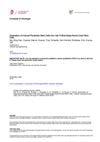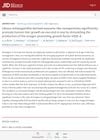 9 citations,
August 1952 in “The Journal of Clinical Endocrinology & Metabolism”
9 citations,
August 1952 in “The Journal of Clinical Endocrinology & Metabolism” A 17-year-old female with adrenogenital syndrome produces very high levels of androgens, which prevent complete feminization despite high estrogen doses.
115 citations,
August 2004 in “The journal of investigative dermatology/Journal of investigative dermatology” Modulating Cytochrome P450 activity could help develop new skin disease treatments.
 96 citations,
February 2007 in “The Journal of Clinical Endocrinology & Metabolism”
96 citations,
February 2007 in “The Journal of Clinical Endocrinology & Metabolism” Women with type 1 diabetes often have polycystic ovary syndrome and excess male hormones, which are frequently undiagnosed.
 7 citations,
June 2022 in “Frontiers in Medicine”
7 citations,
June 2022 in “Frontiers in Medicine” ADSC-derived extracellular vesicles show promise for skin and hair regeneration and wound healing.
 September 1995 in “American Journal of Contact Dermatitis”
September 1995 in “American Journal of Contact Dermatitis” Antiyeast treatments work better for seborrheic dermatitis than steroids, and other findings include increased skin bacteria under plastic wrap, a nasal cell defect in Staphylococcus aureus carriers, quick resolution of certain skin reactions, high rubber latex allergy in spina bifida patients, and glyceryl monopentadecanoate's effectiveness for male hair loss.

PTHrP is important for bone formation and may be targeted for osteoporosis treatment and longevity therapies.
 3 citations,
August 2014 in “Cellular reprogramming”
3 citations,
August 2014 in “Cellular reprogramming” Hair follicle stem cells need all reprogramming factors to become pluripotent.
30 citations,
July 2009 in “Experimental and clinical endocrinology & diabetes” Cyproterone acetate effectively treats sexual disorders by reducing sexual functions and is generally well-tolerated.
 29 citations,
November 2022 in “Nature Medicine”
29 citations,
November 2022 in “Nature Medicine” Genetic variations greatly affect individual metabolism and can impact health and disease risk.
12 citations,
August 2022 in “Ecotoxicology and Environmental Safety” A new method accurately detects bisphenols and parabens in human hair.
 July 2024 in “Journal of Investigative Dermatology”
July 2024 in “Journal of Investigative Dermatology” Ashwagandha nanoparticles help hair grow by increasing a growth factor.
September 2016 in “Ege tıp dergisi/Ege tıp dergisi :” An 11-year-old obese girl was diagnosed with lipedematous scalp, a condition with swollen scalp tissue usually found in adult women.
 August 2023 in “Clinical, Cosmetic and Investigational Dermatology”
August 2023 in “Clinical, Cosmetic and Investigational Dermatology” Research on the human skin microbiome has grown, focusing on skin health and diseases, with more studies needed on antibiotic resistance and AI applications.
 97 citations,
May 2008 in “Journal of Cutaneous Pathology”
97 citations,
May 2008 in “Journal of Cutaneous Pathology” Different soft tissue fillers can cause various skin reactions; biodegradable fillers are safer and non-biodegradable ones like silicone can lead to long-term problems.
 February 2022 in “Research Square (Research Square)”
February 2022 in “Research Square (Research Square)” A protein made in a plant stopped hair growth in mice.
June 2022 in “Endocrine Abstracts” Finasteride can cause lasting skin lightening in women.
 October 2024 in “Experimental Dermatology”
October 2024 in “Experimental Dermatology” The belief about hair shedding phases is likely incorrect and needs reevaluation.
September 2004 in “PubMed” Hair grows in three stages: growing, transition, and resting.
 18 citations,
March 2016 in “Cosmetics”
18 citations,
March 2016 in “Cosmetics” Telogen Effluvium is a condition causing excessive hair loss due to stress, illness, drugs, or hormonal changes, and can be treated with specific products or naturally resolves after 3-4 years.
March 2015 in “Daehan boncho haghoeji/Daehan bonchohak hoeji” Haeae-tang helps hair grow in mice.
 5 citations,
January 2020 in “Skin Research and Technology”
5 citations,
January 2020 in “Skin Research and Technology” Minoxidil 5% works better than 2% for hair growth in male-patterned hair loss.
 April 2023 in “Clinical dermatology review”
April 2023 in “Clinical dermatology review” COVID-19 infection may cause hair loss.
 109 citations,
December 1998 in “The Journal of Dermatology”
109 citations,
December 1998 in “The Journal of Dermatology” Manipulating the catagen and telogen phases of hair growth could lead to treatments for hair disorders.
 May 2024 in “FEBS open bio”
May 2024 in “FEBS open bio” Annurca apple extract may help treat hair loss and protect against oxidative stress.
 July 2018 in “Elsevier eBooks”
July 2018 in “Elsevier eBooks” Telogen Effluvium is a common, usually reversible hair loss condition, often improved by removing the trigger and possibly treated with various products, though their effectiveness is uncertain.
 22 citations,
November 2007 in “Journal of Investigative Dermatology Symposium Proceedings”
22 citations,
November 2007 in “Journal of Investigative Dermatology Symposium Proceedings” Hair growth and health are influenced by stress and hormones.
 53 citations,
November 2006 in “Journal of Endocrinology”
53 citations,
November 2006 in “Journal of Endocrinology” Prolactin slows down hair growth in mice.
 14 citations,
September 2010 in “Annals of Plastic Surgery”
14 citations,
September 2010 in “Annals of Plastic Surgery” Hair restoration has evolved from surgery to drugs to potential gene therapy, with improved results and ongoing research driven by high demand.
 11 citations,
August 2013 in “International Journal of Cosmetic Science”
11 citations,
August 2013 in “International Journal of Cosmetic Science” The study suggests that a new protease inhibitor can make hair harder to pull out, potentially reducing hair loss.
August 2018 in “Jundishapur journal of natural pharmaceutical products” Transfollicular drug delivery can improve medication absorption through hair follicles.





















